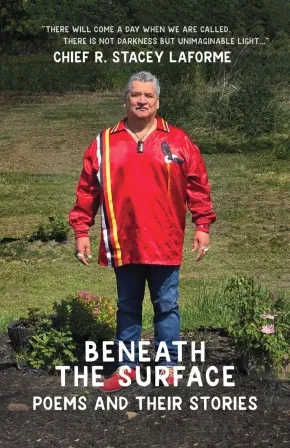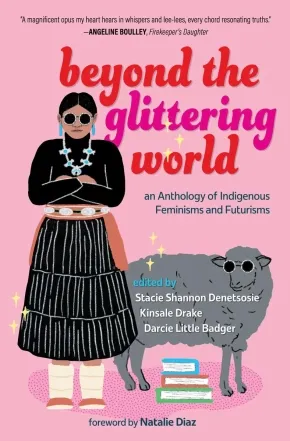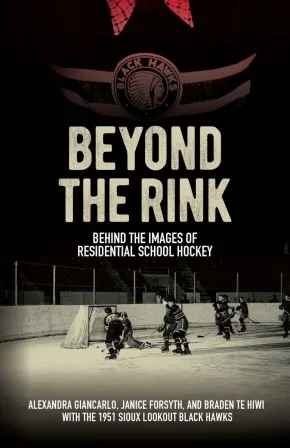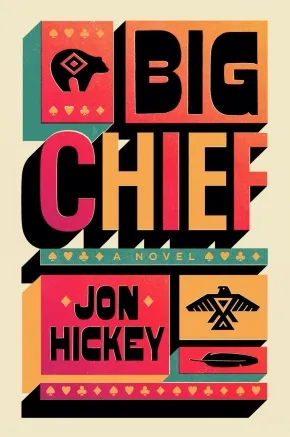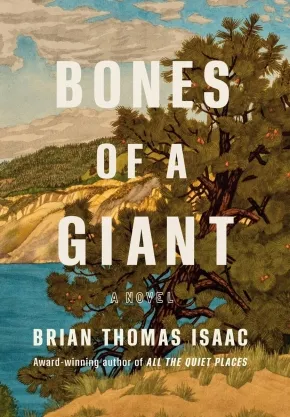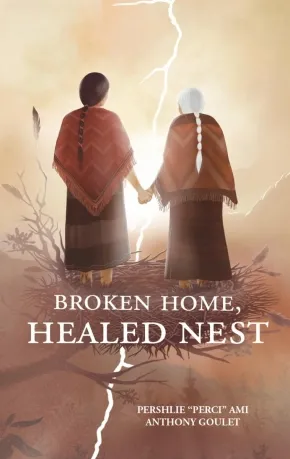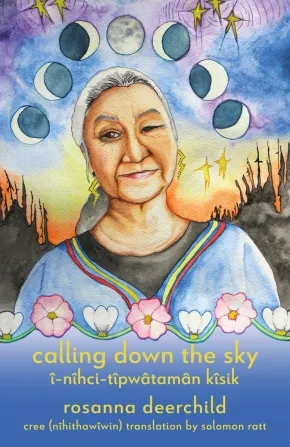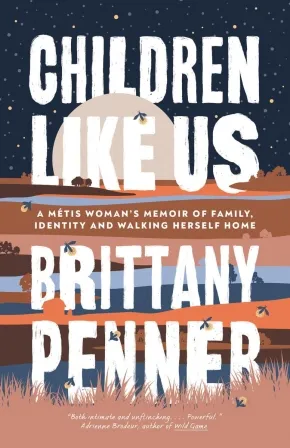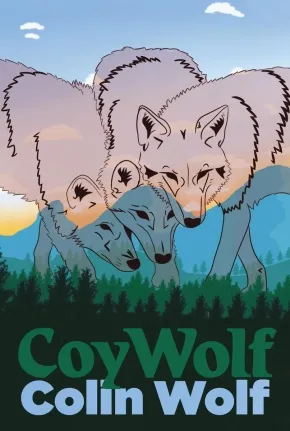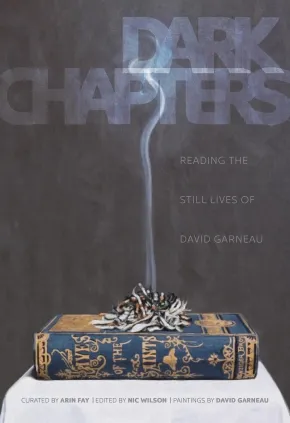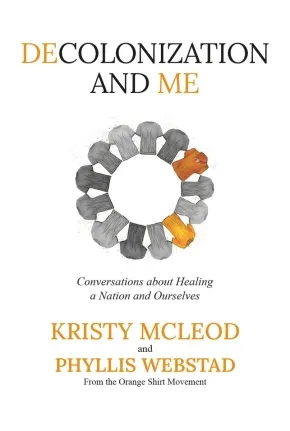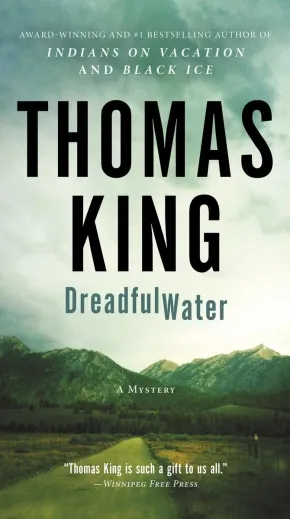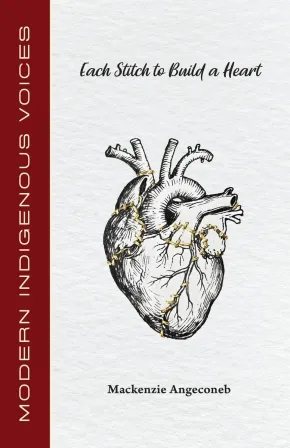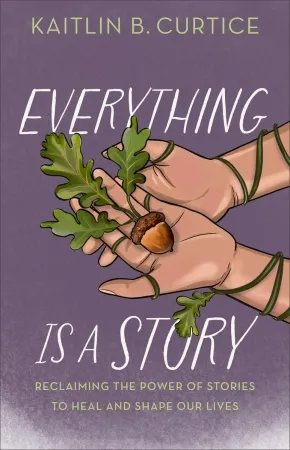
Indigenous Peoples
16
-
30
of
1098 Results;
Sort By
Go To
of 74
Beneath the Surface: Poems & Their Stories
$29.95
Format:
Paperback
Text Content Territories:
Indigenous Canadian; First Nations; Anishinaabeg; Ojibway; Mississaugas;
ISBN / Barcode: 9781990735875
Synopsis:
Synopsis:
Chief Stacey Laforme, an esteemed Indigenous leader and storyteller, breathes life into every poem and story, drawing upon his deep cultural roots. Rich with the essence of his soul, the poems in Beneath the Surface capture the moments and emotions that have shaped him, offering a poignant exploration of identity, resilience, and hope. Through humour and pain, Laforme invites readers to not just read, but to truly feel the weight and wisdom carried within each verse.
This collection goes beyond poetry, providing rich backstories and leadership insights that contextualize the verses. As in his earlier collections, Living in the Tall Grass and Love, Life, Loss and a little bit of hope, Laforme once again extends an invitation to readers, encouraging them to see the world through Indigenous eyes. Themes of peace, humanity, grief, and trauma are woven throughout the book, creating a tapestry of reflection, healing, and ultimately, hope.
Beneath the Surface serves as both a deeply personal reflection and a call for greater understanding and connection, illuminating the complexities of life through the lens of Indigenous wisdom and storytelling.
At the end of this book, this journey, Laforme seeks to help you better answer the following questions. Who was I, Who am I, and Who do I want to be? As a person, a people, a country, a world, who do we want to be?
Additional Information
192 pages | 8.50" x 5.50" | Paperback
Beyond the Glittering World: An Anthology of Indigenous Feminisms and Futurisms
$29.50
Format:
Paperback
Text Content Territories:
Indigenous American; Native American;
Reading Level: N/A
ISBN / Barcode: 9798890920300
Synopsis:
Synopsis:
From adventures in Indigenous futurism to tales of first love, the stories and poems of Beyond the Glittering World proclaim and celebrate a rising generation of Native American storytellers.
Beyond the Glittering World brings together twenty emerging and established Native women writers and writers of marginalized genders, including Moniquill Blackgoose, Heid E. Erdrich, A.J. Eversole, Chelesa Hicks, and D. Daye Hunter. Immersing readers in worlds as varied as their authors, this collection presents an array of singular voices at their genre-bending, boundary-breaking, devastating, and joyous best.
Reviews
"An evocative compilation of voices pondering Indigenous futures and the shape of Indigenous love. Beyond the Glittering World holds a healthy dose of gender-bending, genre-challenging, future-hoping might. This anthology is a welcome addition to the field of Indigenous anthologies.”—DEBORAH JACKSON TAFFA, Whiskey Tender
Additional Information
240 pages | 5.25" x 8.00" | Paperback
Beyond the Rink: Behind the Images of Residential School Hockey
$24.95
Format:
Paperback
Text Content Territories:
Indigenous Canadian;
Reading Level: N/A
ISBN / Barcode: 9781772841060
Synopsis:
Synopsis:
Teammates, champions, Survivors
In 1951, after winning the Thunder Bay district championship, the Sioux Lookout Black Hawks hockey team from Pelican Lake Indian Residential School embarked on a whirlwind promotional tour through Ottawa and Toronto. They were accompanied by a professional photographer from the National Film Board who documented the experience. The tour was intended to demonstrate the success of the residential school system and introduce the Black Hawks to "civilizing" activities and the "benefits" of assimilating into Canadian society. For some of the boys, it was the beginning of a lifelong love of hockey; for others, it was an escape from the brutal living conditions and abuse at the residential school.
In Beyond the Rink, Alexandra Giancarlo, Janice Forsyth, and Braden Te Hiwi collaborate with three surviving team members-Kelly Bull, Chris Cromarty, and David Wesley-to share the complex legacy behind the 1951 tour photos. This book reveals the complicated role of sports in residential school histories, commemorating the team's stellar hockey record and athletic prowess while exposing important truths about "Canada's Game" and how it shaped ideas about the nation. By considering their past, these Survivors imagine a better way forward not just for themselves, their families, and their communities, but for Canada as a whole.
Reviews
"These three survivors-Kelly, David, and Chris-inspire us not only for what they have done for their communities in the aftermath of the residential school system but also for how crucial hockey and sports are in bringing Indigenous communities together, like we see in the Little NHL Tournament. Our history and the lessons we've learned are vital, and Beyond the Rink does an excellent job of highlighting this." — Ted Nolan, former NHL Player & Coach, Olympic Coach, and author of Life in Two Worlds: A Coach's Journey from the Reserve to the NHL and Back
"On its face, Beyond the Rink is a compelling story of a residential school hockey team from northern Ontario touring Ottawa and Toronto in the 1950s. But it is much more than that: with a National Film Board photographer accompanying them every step of the way, the players are props in a public relations exercise meant to obscure the true conditions in residential schools.
This is an unflinching and nuanced look behind the PR veil, a story of loss, triumph, perseverance, tragedy, and memory. It is also a detailed account of the machinery of residential schools and the trauma they inflicted. And it is a revealing look at the power of photographs, which can be used to both illuminate and mislead.
At its heart, Beyond the Rink is the story of twelve Indigenous hockey players, who, like their white counterparts, loved the game for the thrill of competition, but also as an escape from the relentless control and exploitation they faced on a daily basis, even if they were being exploited while doing it. This is the story of twelve boys, told through the lens of three of them, trapped in a world they barely understood, a world that was not the least bit interested in understanding them, and in many ways still isn't." — Gord Miller
"The authors have spent decades working with the Survivors whose stories they share and centre in this book. Beyond the Rink, Behind the Image does not simply tell the story of a hockey team; it demonstrates how sport within the context of residential schools was a tool of colonization." — Karen Froman
"It is difficult to overstate the significance of this book. The scholarship is sound as well as original in context and content, and Survivor testimony is respected and communicated in a theoretically sophisticated way." — Travis Hay
Additional Information
184 pages | 6.00" x 8.50" | 36 b&w illustrations, bibliography | Paperback
Big Chief: A Novel
$34.00
Format:
Hardcover
Text Content Territories:
Indigenous Canadian; First Nations; Anishinaabeg;
Reading Level: N/A
ISBN / Barcode: 9780771015496
Synopsis:
Synopsis:
There There meets The Night Watchman in this gripping literary debut about power and corruption, family, and facing the ghosts of the past.
Mitch Caddo, a young law school graduate and aspiring political fixer, is an outsider in the homeland of his Anishinaabe ancestors. But alongside his childhood friend, Tribal President Mack Beck, he runs the government of the Passage Rouge Nation, and with it, the tribe’s Golden Eagle Casino and Hotel. On the eve of Mack’s reelection, their tenuous grip on power is threatened by a nationally known activist and politician, Gloria Hawkins, and her young aide, Layla Beck, none other than Mack’s estranged sister and Mitch’s former love. In their struggle for control over Passage Rouge, the campaigns resort to bare-knuckle political gamesmanship, testing the limits of how far they will go—and what they will sacrifice—to win it all.
But when an accident claims the life of Mitch’s mentor, a power broker in the reservation’s political scene, the election slides into chaos and pits Mitch against the only family he has. As relationships strain to their breaking points and a peaceful protest threatens to become an all-consuming riot, Mitch and Layla must work together to stop the reservation’s descent into violence.
Thrilling and timely, Big Chief is an unforgettable story about the search for belonging—to an ancestral and spiritual home, to a family, and to a sovereign people at a moment of great historical importance.
Reviews
“A compelling and strong Native American novel about politics and power and how far some people will go to hold on to what they have.”—Brandon Hobson, author of National Book Award finalist Where the Dead Sit Talking
"Deliciously ruthless and absolutely huge, Big Chief unleashes the Shakespearean realities of Passage Rouge with seismic ambition and brilliance. Prepare to relish every dice roll, partisan jab, and monkey wrench thrown in this all-out showdown from maestro Jon Hickey—a colossal novel of and for our time." —Cody Caetano, author of Half-Bads in White Regalia
"Jon Hickey throws the reader in the backseat of a tricked out F350 and takes them for a wild ride across the Rez following a J. Crew NDN, a Chief who's in over his head, and their crew. This is a must read as Hickey brings us into the chaos and catastrophes that the colonial imposed electoral system creates in Indigenous communities but also shows the reader how community, a sense of belonging, and family is what really matters in the end. This is a book that you won't put down until the last ballot is counted."—Conor Kerr, author of Prairie Edge
“Taut, timely, and brimming with suspense, Big Chief questions our notions of power and morality, holding a mirror to our crooked, calculating world. This is a monumental debut."—Kirstin Chen, New York Times bestselling author of Counterfeit
“Big Chief features all the twisty chessmanship—the familial feuds, the financial games, the political maneuvering—of Succession and sets it against the backdrop of Indian country. Jon Hickey has written one hell of an addictive and important debut novel.”—Benjamin Percy, author of The Ninth Metal and Red Moon
Additional Information
320 pages | 5.50" x 8.25" | Hardcover
Bones of a Giant
$35.00
Format:
Hardcover
Text Content Territories:
Indigenous Canadian; First Nations; Salish; Interior Salish; Syilx (Okanagan);
Reading Level: N/A
ISBN / Barcode: 9781039011779
Synopsis:
Synopsis:
From the award-winning, bestselling author of All the Quiet Places, comes Brian Thomas Isaac's highly anticipated, haunting and tender return to the Okanagan Indian Reserve and a teenager's struggle to become a man in a world of racism and hardship.
Summer, 1968. For the first time since his big brother, Eddie, disappeared two years earlier—either a runaway or dead by his own hand—sixteen-year-old Lewis Toma has shaken off some of his grief. His mother, Grace, and her friend Isabel have gone south to the United States to pick fruit to earn the cash Grace needs to put a bathroom and running water into the three-room shack they share on the reserve, leaving Lewis to spend the summer with his cousins, his Uncle Ned and his Aunt Jean in the new house they’ve built on their farm along the Salmon River. Their warm family life is almost enough to counter the pressures he feels as a boy trying to become a man in a place where responsible adult men like his uncle are largely absent, broken by residential school and racism. Everywhere he looks, women are left to carry the load, sometimes with kindness, but often with the bitterness, anger and ferocity of his own mother, who kicked Lewis’s lowlife father, Jimmy, to the curb long ago.
Lewis has vowed never to be like his father—but an encounter with a predatory older woman tests him and he suffers the consequences. Worse, his dad is back in town and scheming on how to use the Indian Act to steal the land Lewis and his mom have been living on. And then, at summer's end, more shocking revelations shake the family, unleashing a deadly force of anger and frustration.
With so many traps laid around him, how will Lewis find a path to a different future?
Reviews
"A compelling novel, honest and compassionate, haunted by the past. Towards the end of the book, I tried to slow down, not wanting the story to end, but it wasn’t possible."—Mary Lawson, bestselling author of A Town Called Solace
"Brian Thomas Isaac reinforces his place as one of Canada’s most engaging novelists with the tender troubling coming-of-age story of Lewis, a 16-year-old growing up on the Okanagan Reserve. He’s a boy who sees and feels everything with intensity—the joy of swimming in a river, the cruelty of a racist neighbour, the complexity of his mother’s love, the sensations of his first deep kiss, the injustices of the Indian Act, which keeps turning his family’s life upside down. I couldn’t put Bones of a Giant down, wondering to the end if Lewis is just too sweet and vulnerable for the mean world around him."—Carol Off, award-winning author of At a Loss for Words
"Bones of a Giant has good bones. Isaac is a masterful storyteller with an observant eye for nature and a deep compassion for his characters. I loved this book."—Thomas Wharton, bestselling author of The Book of Rain
"A clear-eyed love story to both a people and a place. Brian Thomas Isaac is a vital voice."—David Bergen, award-winning author of Here the Dark
Additional Information
320 pages | 6.25" x 9.00" | Hardcover
Broken Home, Healed Nest
$20.99
Format:
Paperback
ISBN / Barcode: 9781778540578
Synopsis:
Synopsis:
“Because you believed me, I began to believe myself. Because of you, I am here.”
[Trigger Warning] Please note this book addresses sensitive topics including suicide, substance abuse, and family violence. While these emotionally challenging realities are held thoughtfully, and with love, this story may be triggering.
Jessica has contemplated suicide for a while now. Grappling with the reverberating grief of losing her beloved grandmother and the trauma of a broken home, young Jessica is reaching a place so far from herself, her community, and the traditional Indigenous teachings she once lived by, it is frightening.
When it all becomes too much, Jessica attempts to take the final step over the ledge. What follows is a journey through the sacred spaces within memory, song, and the spirit world, guided by two playful tricksters—eagles, who happen to have lifetimes of wisdom to share.
With a love of riddles and soaring beyond the edges of possibility, they turn and twist Jessica’s reality until she can finally ground herself in what she has known all along, and allow the love, strength and voice of her beloved grandmother to once again be remembered and heard. The trajectory of Jessica’s life will be changed forever.
From Hopi Elder, Pershlie "Perci" Ami, and Street Outreach Worker, Anthony Goulet, comes a creative, sensitive, and thoughtful approach to the topic of suicide. Combined, they have over forty years of experience in youth development and suicide prevention.
Educator Information
Recommended for ages 14+
Trigger Warning: Please note this book addresses sensitive topics including suicide, substance abuse, and family violence. While these emotionally challenging realities are held thoughtfully, and with love, this story may be triggering.
Additional Information
109 pages | 5.50" x 7.50" | Paperback
Calling Down the Sky: Tenth Anniversary Edition
$24.95
Text Content Territories:
Indigenous Canadian; Métis; Inuit; First Nations;
ISBN / Barcode: 9781552455159
Synopsis:
Synopsis:
A tenth anniversary bilingual edition in English and Cree of Rosanna Deerchild’s stunning collection about the intergenerational impacts of the Canadian residential school system.
you want me to
share my story
ok then
here it is
here in the unwritten
here in the broken lines
of my body that can never forget
In Calling Down the Sky, poet Rosanna Deerchild viscerally evokes her mother’s experience within the residential school system, the Canadian government’s system of violently removing Indigenous children from their homes, families, and languages in an explicit attempt to destroy Indigenous cultures and identities. With precise and intricate poetry, Deerchild weaves together the story of her mother’s childhood and Deerchild’s memories of her mother: her love of country music, her attempts to talk about what happened to her, how tightly she braided her daughter’s hair on the first day of school. In doing so, Deerchild illustrates the disruptive and devastating impacts of the residential school system on generations of families while also celebrating the life and culture of her mother and other survivors.
Published for the first time in a bilingual edition of Cree and English, in time for the tenth anniversary of the original publication, Calling Down the Sky is an intimate and gorgeously evoked reckoning with a horrifying part of North American history.
Reviews
“Rosanna Deerchild’s poems roll off the tongue as easy as old country songs. With her deft hand, Deerchild finely tunes every word and weaves them together as intimately as she braids her girls’ hair. Together, these poems create a story that sings with beautiful tension, amazing resilience, and love as big as the sky." - Katherena Vermette, Métis Writer
"The poetry collection, called calling down the sky, describes personal experiences with the residential school system in the 1950s and the generational effects it had." - CBC
"This poetry collection is fierce, raw and candid. It is also visceral, intricate and, above all, illuminating. By recounting her mother’s residential school experience in a powerfully poetic narrative, Deerchild expertly illustrates the heartbreaking trauma of that tragic saga and how it complicates relationships over generations. By beautifully and elaborately exploring those relationships and that devastating history, she finds and celebrates the resilient and hopeful spirit that many residential school survivors, like her mother, have managed to retain in the face of horror and torment. As a result, calling down the sky is an essential read in understanding the true modern history of this land and in honouring the people who survived it.” - Waubgeshig Rice
Educator Information
Bilingual: English and Cree
Additional Information
96 pages | 5.50" x 8.50"
Children Like Us: A Métis Woman's Memoir of Family, Identity and Walking Herself Home
$26.00
Format:
Paperback
Text Content Territories:
Indigenous Canadian; Métis;
Reading Level: N/A
ISBN / Barcode: 9780385688000
Synopsis:
Synopsis:
A Métis girl is adopted by a Mennonite family in this breathtaking memoir about family lost and found—for those who loved From the Ashes and Educated.
By the time Brittany Penner is seven years old, she has loved and lost twenty-one foster siblings who have come into her family and left—all of them Indigenous like her. "When will it be my turn?" she asks her mother time and time again. "When will I be taken away?" You won't be, she is told. You're adopted. You're here to stay. You're the lucky one.
On the day of her birth in 1989, near the end of the Sixties Scoop, Brittany was relinquished into the care of the government and adopted by a white Mennonite family in a small prairie town. Her name and where she came from are hidden from her; all she is told is that she is Métis. Her childhood is shaped by church, family, service and silence. Her family is continuously shifting as siblings arrive and depart, one by one. She knows that to stay, she has to force herself into the mold created for her. She must be obedient. Quiet. Good. No matter what.
Whenever she looks in the mirror, she searches her features, wondering if they've been passed down to her by her biological mother. She thinks, if she can find her mother, she'll find all the answers she's looking for. As Brittany moves into adulthood, she will uncover answers—but they will be more tangled than she could have imagined.
Children Like Us asks difficult questions about family, identity, belonging and cultural continuity. What happens when you find what you're looking for, but it can't offer you everything you need? How do you reckon with the truth of your own story when you've always been told you're lucky and should be grateful? What does it mean to belong when you feel torn between cultures? And how does a person learn to hold the pain and the grief, as well as the triumphs, the joys and the beauty, allowing none to eclipse the others?
Reviews
"Children Like Us is a luminous memoir about identity, loss and belonging. Adopted at birth by a white Mennonite family, Brittany Penner grows up straddling two worlds—one she knows and one that remains just out of reach. As she pieces together her origins, she reckons with the complexities of family, love and cultural displacement. Both intimate and unflinching, Children Like Us is a powerful exploration of what it means to know where you come from—and what it costs when that knowledge is withheld." —Adrienne Brodeur, nationally bestselling author of Wild Game
"An absolutely mesmerizing debut. It was a privilege to bear witness to Brittany Penner's story about intergenerational trauma, identity, and belonging. The kinds of complicated grief we so often experience in life are born out of the complexity of human relationships and our fierce ability to both hurt and heal one another. Penner explores this truth deftly, with wisdom, compassion and grace. I hope everyone reads this book." —Claire Bidwell Smith, author of The Rules of Inheritance
Additional Information
384 pages | 5.62" x 8.25" | Paperback
CoyWolf
$18.95
Format:
Paperback
Text Content Territories:
Indigenous Canadian; Métis;
Reading Level: N/A
ISBN / Barcode: 9780369105738
Synopsis:
Synopsis:
Isidor, a half-coyote, half-wolf coywolf, has always struggled to find his place as a half-breed. After the untimely death of his mother, he leaves his community to roam across prairies, forests, and mountains, sharing stories in his search for kinship and belonging. But as Sharp-Tooths are increasingly policed, tagged, or killed to make way for insatiable human expansion, Isidor and his pack are forced to make impossible decisions. Do they retreat to better their chances of survival, or risk everything by joining a resistance of rogue animals to protect what’s left of their homeland?
In this gripping drama, Colin Wolf weaves a powerful allegory through the lives of animals, paralleling the displacement of Métis people and the enduring struggle for Indigenous land rights on Turtle Island. CoyWolf is a hopepunk thriller and a roadmap for young revolutionaries navigating the realities of resistance, doing your best, and learning the wisdom of those who have walked the path before.
Additional Information
112 pages | 5.12" x 7.62" | Paperback
Dark Chapters: Reading the Still Lives of David Garneau
$32.95
Artists:
Editors:
● Arin Fay
Format:
Paperback
Text Content Territories:
Indigenous Canadian; Métis;
ISBN / Barcode: 9781779400536
Synopsis:
Synopsis:
A singular collection of responses to the still life paintings of acclaimed artist David Garneau
Dark Chapters brings together 17 poets, fiction writers, curators, and critics to engage with the works of David Garneau, the Governor General’s Award-winning Métis artist. Featuring paintings from Garneau’s still life series “Dark Chapters” alongside poetry, fiction, critical analysis, and autotheory, the book includes contributions from Fred Wah, Paul Seesequasis, Jesse Wente, Lillian Allen, Billy-Ray Belcourt, Larissa Lai, Susan Musgrave, and more.
A nod to the Reports of Truth and Reconciliation Commission, in which Justice Murray Sinclair describes the residential school system as “one of the darkest, most troubling chapters in our nation’s history,” Garneau’s still life paintings combine common objects (books, bones, teacups, mirrors) and less familiar ones (a Métis sash, a stone hammer, a braid of sweetgrass) to reflect the complexity of contemporary Indigenous experiences. Provocative titles like “Métis in the Academy” and “Smudge Before Reading” invite consideration of the mixed influences and loyalties faced by Indigenous students and scholars. Other paintings explore colonialism, vertical and lateral violence, Christian influence on traditional knowledge, and museum treatment of Indigenous belongings.
Rooted in Garneau’s life-long engagement at the intersections of visual art and writing, Dark Chapters presents a multifaceted reflection on the work of an inimitable, unparalleled artist.
Includes contributions from Arin Fay, Billy-Ray Belcourt, Cecily Nicholson, David Howes, Dick Averns, Fred Wah, Jeff Derksen, Jesse Wente, John G. Hampton, Larissa Lai, Lillian Allen, Paul Seesequasis, Peter Morin, Rita Bouvier, Susan Musgrave, Tarene Thomas, and Trevor Herriot.
Reviews
“A smart collection of art and essays, Dark Chapters activates deep conversations about art, resistance, and sovereignty. Visiting with paintings by Métis artist David Garneau, seventeen poets, curators, and thinkers offer complex provocations that trouble and activate new forms of communities and relationships.” —Dr. Carmen Robertson, Canada Research Chair in North American Indigenous Visual and Material Culture
“Provocative, probing, and precarious, Dark Chapters pairs the poetic, literary, political, and critical responses of seventeen authors with the deceptively uncluttered yet gravid and combustible still lifes of David Garneau. This collection of pictures and words undertakes a necessary examination of the uncanny oppositions and disquieting literal and symbolic inversions that signify and animate the Indigenous history of Canada.” —Bonnie Devine
“Dark Chapters is a lesson in relationality and innovation. Built through conversations between Garneau’s work and artists/writers, the intergenerational contributors to this book come together in relation to Garneau and his still lives to explore the important contribution the artist has made to Canadian, Indigenous, and International art.” —Erin Sutherland
Educator Information
Table of Contents
Foreword
Nic Wilson
Still Life
John G. Hampton
Stone and Rock: I Have Failed You
Peter Morin
Wander Carried
Cecily Nicholson
On Kinship
Paul Seesequasis
Learning from Indigenous Academic Solidarity
Jeff Derksen
Knock Knock
Lillian Allen
Unsettling the Colonial Gaze
Trevor Herriot
Smudge Before Reading and The Land Does Not Forget
Tarene Thomas
Confession (after David Garneau) by Rita Bouvier
Fuse and Formal and Informal Education
Jesse Wente
The Problem with Pleasure
Billy-Ray Belcourt
Métis Realism: On the Materiality of Smoke and Relationality of Rocks
David Howes
Allies (after Hsieh and Montano)
Larissa Lai
Ally Tear Reliquary
Arin Fay
Understanding Attempted Enlightening: Between Language as Power…and Light as Life
Dick Averns
Spine
Fred Wah
The Resting Heartbeat of a Wounded Bird
Susan Musgrave
Gallery
About the Artist
About the Curator
About the Editor
About the Contributors
List of Artworks
Index
Additional Information
160 pages | 6.50" x 9.50" | 58 colour illustrations | Paperback
Decolonization and Me: Conversations about Healing a Nation and Ourselves
$30.99
Text Content Territories:
Indigenous Canadian; First Nations; Salish; Interior Salish; Secwepemc (Shuswap); Stswecem'c Xgat'tem; Métis;
Reading Level: N/A
ISBN / Barcode: 9781778540684
Synopsis:
Synopsis:
This book invites readers to step into a space of reflection on your personal relationship with truth, reconciliation, and Orange Shirt Day.
Written in response to the increase of residential school denialism, Phyllis Webstad and Kristy McLeod have collaborated to create a book that encourages readers to face their own biases. This book challenges readers through a series of sensitive conversations that explore decolonization, Indigenization, healing, and every person’s individual responsibility to truth and reconciliation. Centered around the Orange Shirt Day movement, and a National Day for Truth and Reconciliation, these conversations encourage readers to unpack and reckon with denialism, biases, privilege, and the journey forward, on both a personal and national level.
Within each chapter, Phyllis Webstad draws on her decade of experience (sharing her Orange Shirt Story on a global level and advocating for the rights of Indigenous Peoples) to offer insights on these topics and stories from her personal journey, which co-author and Métis scholar, Kristy McLeod, helps readers to further navigate. Each section includes real denialist comments taken from social media and Kristy's analysis and response to them. Through empathy-driven truth-telling, this book offers an opportunity to witness, reflect, heal, and be intentional about the seeds we hope to plant for the future, together.
Additional Information
350 pages | 5.70" x 8.25" | Hardcover
DreadfulWater (PB)
$13.99
Format:
Paperback
Text Content Territories:
Indigenous American; Native American; Cherokee;
Grade Levels: 12; University/College;
ISBN / Barcode: 9781443474962
Synopsis:
Synopsis:
The award-winning, bestselling author of The Back of the Turtle and The Inconvenient Indian masters the comic mystery novel in this series opener, starring ex-cop Thumps DreadfulWater.
Thumps DreadfulWater is a Cherokee ex-cop trying to make a living as a photographer in the small town of Chinook, somewhere in the northwestern United States. But he doesn’t count on snapping shots of a dead body languishing in a newly completed luxury condo resort built by the local Indian band. It’s a mystery that Thumps can’t help getting involved in, especially when he realizes the number one suspect is Stick Merchant, anti-condo protester and wayward son of Claire Merchant, head of the tribal council and DreadfulWater’s sometimes lover. Smart and savvy, blessed with a killer dry wit and a penchant for self-deprecating humour, DreadfulWater just can’t manage to shed his California cop skin. Before long, he is deeply entangled in the mystery and has his work cut out for him.
Reviews
"The characters are really clever. . . . The dialogue is crisp and just begs to head to the screen." — The Globe and Mail
Educator & Series Information
This book is part of the DreadfulWater Mystery Series.
Books in this series include:
- Dreadful Water
- The Red Power Murders
- Cold Skies
- A Matter of Malice
- The Obsidian Murders
- Deep House
- Double Eagle
- Black Ice
A novel that will appeal to mystery fans as well as Thomas King’s loyal audience, DreadfulWater is a catchy, clever read.
Additional Information
464 pages | 4.19" x 7.50" | Paperback
Each Stitch to Build a Heart
$19.95
Format:
Paperback
Text Content Territories:
Indigenous Canadian; First Nations; Anishinaabeg; Ojibway; Lac Seul;
Reading Level: N/A
ISBN / Barcode: 9781772312577
Synopsis:
Synopsis:
The central theme of this poetry collection revolves around the idea that each individual is shaped by the connections they forge with others throughout their lives. Each poem serves as a tribute to the relationships that influence us, weaving a rich tapestry of shared experiences and emotions. The collection is guiding readers through a journey of reflection and introspection. Each poem follows a distinct outline: it begins with a cherished memory that encapsulates the essence of the relationship, then delves into the significance of that bond and what it has taught us. Next, the poems explore the evolution of these connections—whether they have transformed, faded away, or remain vibrant in our lives. As the verses unfold, they evoke sensory reminders of these individuals—objects, places, or moments that bring them to mind—while also celebrating the qualities we admire in them. The poems culminate in a heartfelt exploration of their lasting impact on our identities and the permanent marks they leave behind. Each poem becomes a mirror, inviting readers to consider their own relationships and the intricate ways in which these connections shape who they are. Through this collection, we are reminded that we are, in many ways, a mosaic of everyone we have loved, learned from, and lost along the way.
Educator & Series Information
This book is part of the Modern Indigenous Voices series.
Additional Information
96 pages | 5.50" x 8.50" | Paperback
Elements of Indigenous Style: A Guide for Writing By and About Indigenous Peoples - 2nd Edition
$27.95
Editors:
Format:
Paperback
Text Content Territories:
Indigenous Canadian;
Reading Level: N/A
ISBN / Barcode: 9781550599459
Synopsis:
Synopsis:
The groundbreaking Indigenous style guide every writer needs.
The first published guide to common questions and issues of Indigenous style and process for those who work in words and other media is back in an updated new edition. This trusted resource offers crucial guidance to anyone who works in words or other media on how to work accurately, collaboratively, and ethically on projects involving Indigenous Peoples.
Editor Warren Cariou (Métis) and contributing editors Jordan Abel (Nisga’a), Lorena Fontaine (Cree-Anishinaabe), and Deanna Reder (Cree-Métis) continue the conversation started by the late Gregory Younging in his foundational first edition. This second conversation reflects changes in the publishing industry, Indigenous-led best practices, and society at large, including new chapters on author-editor relationships, identity and community affiliation, Two-Spirit and Indigiqueer identities, sensitivity reading, emerging issues in the digital world, and more.
This guide features:
- Twenty-two succinct style principles.
- Advice on culturally appropriate publishing practices, including how to collaborate with Indigenous Peoples, when and how to seek the advice of Elders, and how to respect Indigenous Oral Traditions and Traditional Knowledge.
- Terminology to use and to avoid.
- Advice on specific editing issues, such as biased language, capitalization, citation, accurately representing Indigenous languages, and quoting from historical sources and archives.
- Examples of projects that illustrate best practices.
Additional Information
208 pages | 5.50" x 7.50" | Paperback
Everything Is a Story: Reclaiming the Power of Stories to Heal and Shape Our Lives
$33.99
Format:
Hardcover
Text Content Territories:
Indigenous;
Reading Level: N/A
ISBN / Barcode: 9781587436635
Synopsis:
Synopsis:
Stories are alive--and shape our personal and collective identities, for better and worse.
In Everything Is a Story, award-winning Indigenous author Kaitlin B. Curtice considers how stories take root in our lives like an acorn becoming an oak tree. Following a story's life cycle, Curtice explores how narratives shape both our inner lives and broader communities. Which stories should we pass on to future generations--and which can we finally let go?
This book invites readers to explore the power of story to liberate or limit, to build compassion or create division. With gentle insight that speaks to people across the spiritual spectrum, Curtice guides us through the art of storytelling as a path toward healing and connection.
With contemplative poetry woven throughout and a foreword by Simran Jeet Singh, Everything Is a Story offers a hope-filled framework for reshaping our lives by reclaiming stories of courage, wholeness, and deep-rooted compassion.
Reviews
"A beautiful book about the stories that make us who we are and connect us to the earth, the cosmos, and one another."- Eboo Patel, founder and president, Interfaith America; author of We Need to Build: Field Notes for Diverse Democracy
"As most good communicators know, we best understand our world not through data or evidence or reason but mostly through stories. That's why this is such a potentially powerful book for those who read it!" - Bill McKibben, author of Here Comes the Sun
Educator Information
Table of Contents
Foreword by Simran Jeet Singh
As We Begin
Part 1: Seed
1. The Origins of Stories
2. Oak Stories
3. Stories Are Mirrors
4. The Shape of Stories
Part 2: Sprout
5. Gathering Stories
6. Stories of Faith and Religion
7. Returning to Our Body's Stories
8. A Maze of Stories
Part 3: Sapling
9. Stories of Aging and Happiness
10. Stories We Tell About One Another
11. Stories of Myth and Othering
12. Stories of Sports and Exploration
Part 4: Mature Tree
13. Stories Are Labels
14. Stories of Land and Food
15. Stories Told in Public
16. Stories of Belief and Letting Go
Part 5: Dropping Seeds
17. Interfaith, Expansive, Futuristic Stories
18. Merging Stories
19. Stories for Healing
20. The Future of Storytelling
Additional Information
208 pages | 5.50" x 8.50" | Hardcover
Sort By
Go To
of 74

